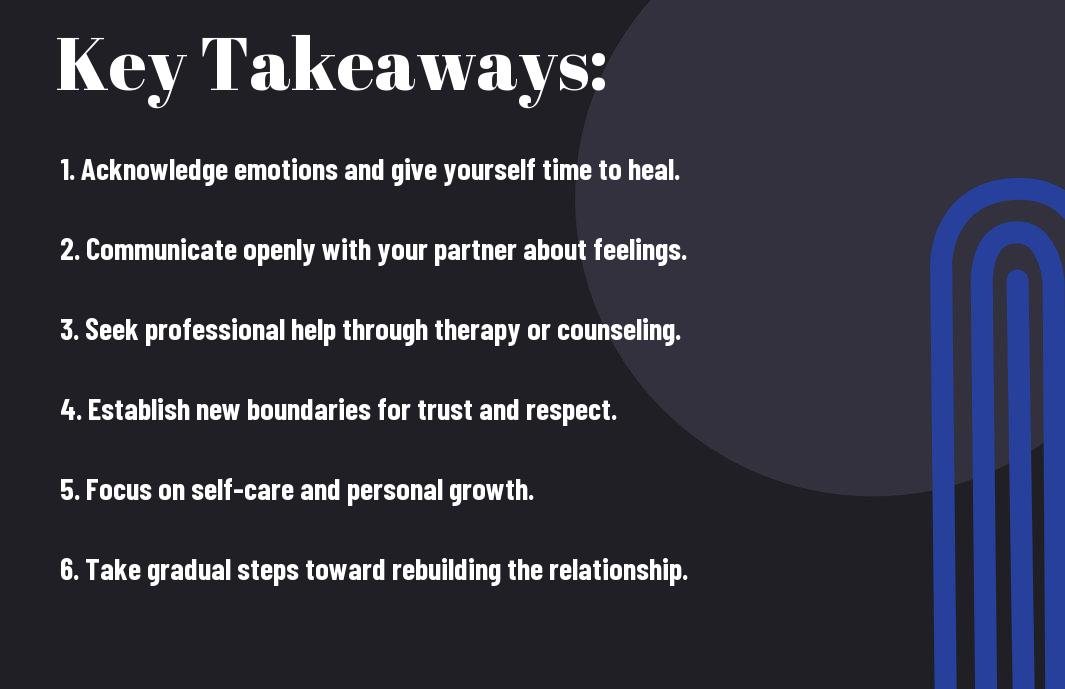Betrayal in marriage can feel like a devastating blow, challenging everything you thought you knew about love and commitment. It’s important to recognize that despite the intense pain, you have the power to rebuild your life and restore your emotional health. In this post, you will discover effective tools that can guide you through the turbulent aftermath of betrayal, helping you to regain your strength, redefine your relationship, or even find newfound happiness as you move forward. Let’s explore how you can navigate this difficult journey with resilience and hope.
Key Takeaways:
- Recognize the emotional impact of betrayal and allow yourself to feel and process these emotions.
- Communicate openly with your partner to understand the reasons behind the betrayal and express your feelings.
- Seek professional help, such as couples therapy, to navigate the complexities of rebuilding trust and intimacy.
- Establish boundaries within the relationship to facilitate healing and ensure both partners feel safe.
- Focus on self-care and personal growth as you work through the aftermath of betrayal.
- Rebuild trust gradually by fostering transparency and accountability in your relationship.
- Explore forgiveness, recognizing that it is a personal journey that may take time and is necessary for moving forward.


Understanding Betrayal
The experience of betrayal in marriage can be profound, affecting emotional bonds and trust. Understanding the various dimensions of betrayal is key to healing, as it allows you to identify your feelings and approach the recovery process thoughtfully.
Types of Betrayal in Marriage
- Emotional Affair: Involves forming a deep emotional connection with someone outside the marriage.
- Physical Infidelity: Engaging in sexual relations with someone other than your partner.
- Financial Betrayal: Hidden financial behaviors that undermine trust and security.
- Friendship Betrayal: Pursuing romantic or intimate relationships with close friends of your partner.
- Chronic Lying: Continual deception that erodes trust over time.
Assume that recognizing these forms of betrayal will help you pinpoint the source of your pain and guide you through the healing process.
| Type of Betrayal | Description |
| Emotional Affair | Deep emotional connection outside of marriage |
| Physical Infidelity | Sexual relations outside marriage |
| Financial Betrayal | Undermining trust with hidden finances |
| Friendship Betrayal | Romantic pursuits with mutual friends |
| Chronic Lying | Continual deception |
Emotional Impact on Partners
An emotional betrayal can evoke a range of painful feelings, including anger, sadness, and confusion. It can make you question your self-worth and the authenticity of your partner’s love and commitment, leading to a deep sense of loss and vulnerability.
Betrayal significantly influences how you view yourself and your relationship. The emotional fallout can create a feeling of being unworthy, leading to insecurity and detachment. Feelings of betrayal can spark distrust in every aspect of your life, affecting not just your marriage but also your relationships with friends and family. It’s vital to acknowledge the emotional ramifications on your partner as well, as healing requires both of you to confront its impact openly.
Recognizing the Signs of Betrayal
Assuming you are aware of your partner’s behaviors and overall dynamics in your marriage, being vigilant for signs of betrayal is necessary. Betrayal can manifest in numerous forms, and recognizing these signs early can help you address issues before they escalate. Look for behavioral shifts, emotional distance, or a decline in communication, as these may signify deeper troubles in your relationship that warrant your attention.
Subtle Indicators
Around your relationship, you might notice subtle indicators that something is amiss. This can include changes in routine, secretive behaviors, or a lack of interest in previously shared activities. These subtle shifts can often be overlooked but play a significant role in highlighting underlying problems that may go beyond simple disagreements.
Open Acknowledgment
Above all, when open acknowledgment occurs, it can be a powerful step toward healing. Acknowledgment of the betrayal, whether from you or your partner, indicates recognition of the issue at hand. This honesty about painful feelings and experiences is necessary, as it can serve as the first step in reclaiming trust and intimacy in your relationship.
Signs of open acknowledgment demonstrate a willingness to confront the reality of betrayal. When you reach this point, both you and your partner have the chance to engage in necessary conversations, laying the groundwork for understanding and healing. Embracing this acknowledgment allows for the expression of feelings that may have been bottled up, fostering an environment where honesty will pave the way for rebuilding trust and ultimately, your relationship. Taking this step can serve to deepen the emotional connection between you and your partner, making the healing process more effective.

Effective Communication Strategies
To navigate the rocky waters of betrayal in a marriage, employing effective communication strategies is imperative. Open dialogue helps you articulate your feelings and understand your partner’s perspective, fostering an environment of empathy and healing. Focus on honesty while ensuring that the conversation is respectful and constructive, creating a safe space for both of you to express emotions without fear of judgment.
Initiating Difficult Conversations
One way to initiate difficult conversations is to choose the right time and setting. Make sure you are both calm and free from distractions, allowing for an open and sincere discussion. Being honest about your feelings while approaching the topic gently can set a positive tone and may lead to more productive interactions.
Active Listening Techniques
Above all, implementing active listening techniques can transform how you engage in these discussions. It involves not just hearing the words your partner says but truly understanding their emotions behind those words. You can do this by maintaining eye contact, nodding to show engagement, and repeating back what you hear to ensure clarity. These actions demonstrate that you value their perspective, which is imperative for rebuilding trust and connection.
With active listening, it’s vital to eliminate distractions and stay present in the moment. You should refrain from interrupting and give your partner the space to express themselves fully. By acknowledging their feelings and validating their experiences, you create an atmosphere where both partners feel heard and respected. This technique can lead to deeper conversations, fostering reconciliation and a renewed commitment to the relationship.
Rebuilding Trust After Betrayal
Unlike the immediate aftermath of betrayal, which often feels chaotic and overwhelming, rebuilding trust is a gradual process that requires sincere effort from both partners. It involves open communication, patience, and a commitment to understanding each other’s feelings. Recognize that trust can be re-established over time, but you must both be dedicated to nurturing the relationship and fostering an environment where honesty flourishes.
Steps to Regain Trust
Beside the emotional turmoil, you can take practical steps to regain trust. Start by having honest conversations about what led to the betrayal and your feelings surrounding it. Create a safe space for sharing vulnerabilities and establishing new boundaries. By consistently showing empathy and commitment, you can slowly rebuild a solid foundation for your relationship.
Importance of Transparency
With transparency in your relationship, you allow room for trust to blossom. It’s necessary to share your daily experiences, feelings, and struggles, reinforcing that you are dedicated to fostering intimacy. Maintaining a clear line of communication will help you both feel secure, minimizing misunderstandings and fear that can often arise after betrayal.
In addition, practicing transparency goes hand in hand with accountability. When you openly share aspects of your life, including your thoughts and actions, it demonstrates your commitment to restoring trust. Engaging in honest dialogues allows you to address any lingering doubts while also reinforcing your reliability. It is vital for you to remain steadfast in your transparency, as it helps create a sense of security and reassurance that promotes healing. The more you share and listen to one another, the stronger your bond will become as you navigate this challenging journey together.
Seeking Professional Help
All relationships can benefit from external support, especially when facing betrayal. Seeking professional help can provide a safe space to explore your feelings, facilitate communication, and guide both partners toward healing and understanding. Engaging with a licensed therapist can equip you with effective strategies to navigate the emotional turmoil that often arises in the aftermath of marital betrayal.
Couples Counseling
The process of couples counseling involves both partners working together with a trained therapist to address the issues stemming from betrayal. This setting allows you to safely express your emotions and needs, fostering better understanding and empathy between you and your partner. With guided support, you can begin to rebuild trust and establish healthier communication patterns going forward.
Individual Therapy Options
Individual therapy offers you a personal space to process your emotions, thoughts, and experiences after betrayal. This may include exploring the underlying issues that contributed to the situation and developing coping mechanisms to heal and move forward. It allows you to focus on your own well-being and personal growth while managing the stress and hurt related to your marriage.
Seeking individual therapy can be a formative step in your healing process. This type of therapy not only helps you develop a deeper understanding of your feelings but also encourages you to explore your personal strengths and patterns. By engaging in this process, you can gain clarity on what you want from your marriage and your life moving forward. Individual therapy empowers you to build resilience while addressing any emotional trauma that betrayal may have caused, equipping you with the tools to create a fulfilling life, whether within or outside your relationship.
Tools for Personal Growth
Now, in the aftermath of betrayal, focusing on your personal growth is important for healing. It’s important to seek resources that guide you through this process, such as learning How to Rebuild Trust and Connection After Betrayal. Engaging in introspection and actively pursuing tools that foster growth can empower you on your journey towards a stronger, healthier self.
Self-Care Practices
By taking the time to implement dedicated self-care practices, you can rejuvenate your mind and body, allowing for emotional healing. This can include activities such as exercise, journaling, pursuing hobbies, and spending quality time with supportive friends or family. Prioritizing your well-being is not only important for recovery but also sets the foundation for a renewed sense of self.
Developing Emotional Resilience
Any path to healing involves strengthening your emotional resilience, which allows you to navigate the ups and downs of recovery. You will face moments of doubt, sadness, and anger, but building resilience will empower you to bounce back from these challenges. This can be achieved by embracing a growth mindset, practicing mindfulness, and openly expressing your emotions to cultivate a more robust emotional foundation.
Developing emotional resilience requires a strong commitment to personal growth and self-awareness. It’s about recognizing and accepting your emotions while finding constructive ways to cope with challenges. Strategies such as mindfulness meditation or engaging in creative outlets can significantly enhance your ability to process feelings and emerge stronger than before. By doing so, you create a buffer against future adversities, making it easier for you to approach life with confidence and a positive outlook.
To wrap up
Considering all points, navigating betrayal in marriage can be an immensely challenging journey, but with the right tools, you can rebuild your life. It’s imperative to prioritize open communication, seek professional guidance, and foster self-care as you work through your emotions. As you process the betrayal, focus on establishing trust and intimacy, whether with your partner or within yourself. By committing to healing and growth, you can emerge stronger and more resilient, ultimately paving the way for a healthier future in your relationship or in your personal life.
FAQ
Q: What should be my first step after discovering betrayal in my marriage?
A: The initial step is to process your emotions. Allow yourself to feel anger, sadness, or confusion without rushing to make decisions. It’s vital to take some time to reflect on your feelings and consider what you truly want moving forward before engaging in any discussions with your partner.
Q: How can communication help in rebuilding trust after betrayal?
A: Open and honest communication is vital for rebuilding trust. Setting aside time to discuss feelings, motivations behind the betrayal, and future expectations can foster understanding. It’s important both partners participate in these discussions with a willingness to listen actively and express their thoughts and emotions safely.
Q: What tools can help in managing my emotions during this tough time?
A: Emotional management tools include journaling, therapy, and mindfulness practices such as meditation or deep breathing exercises. Engaging in physical activities like yoga or hiking can also help you process feelings and reduce stress. Consulting a therapist specializing in relationship issues can provide guidance tailored to your unique situation.
Q: Is it possible to rebuild a marriage after betrayal and how long does it usually take?
A: Yes, rebuilding a marriage after betrayal is possible, but it requires commitment and effort from both partners. The timeline can differ widely based on individuals and circumstances. Healing can take months or even years, but consistent communication, therapy, and a shared dedication to work on the relationship can lead to recovery and growth.
Q: Should I seek professional help, and when is the right time to do so?
A: Seeking professional help is advisable, especially if emotions feel overwhelming or if you struggle to communicate with your partner effectively. Engaging a therapist can provide you with tools to navigate your feelings and improve your relationship dynamics. It’s beneficial to seek help early in the process to establish a solid foundation for healing.
